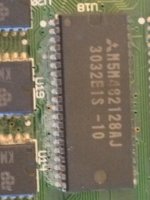I've not tried this yet, and I won't do it to a precious apple board
until I've confirmed it on a scrap board:
50/50 mix of water, vinegar, and some salt, scrub with toothbrush.
Maybe one tablespoon of salt per cup of liquid? It's guesswork.
Rinse this with water, then rinse again with rubbing alcohol.
Use 91% alcohol, not the 50% or the green "witch hazel" stuff.
Then scrub with a mixture of water and baking soda.
A few tablespoons per cup? Again, guesswork.
For the final rinse, use generic bottled filtered water
instead of tap water, and not "spring" water which might
contain delicious trace minerals.
Microwave this water to get it near boiling.
Get the board bone-dry by "baking" it in the oven at very low
temperature, approx 125degrees F for a half hour.
That or place in front of a large fan for a day.
Water likes to bead up and hide in crevasses, less of a concern on
the larger-pitched parts on 1980's electronics, a real pain to achieve
bone-dry status on modern BGA based laptop motherboards.
If you want to skip a step, just make a 50/50 mix of vinegar and baking soda.



